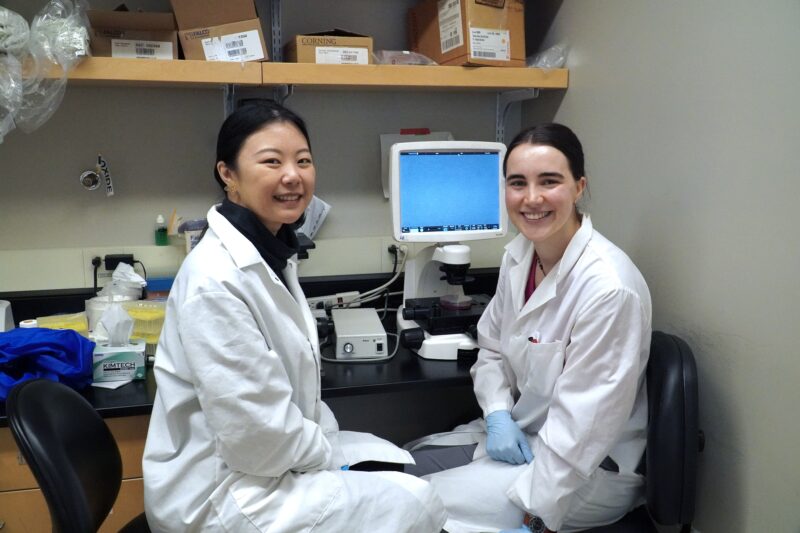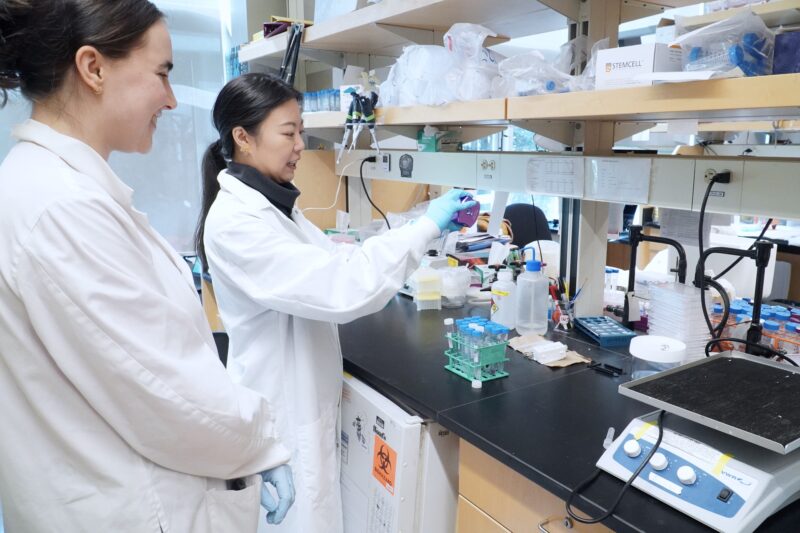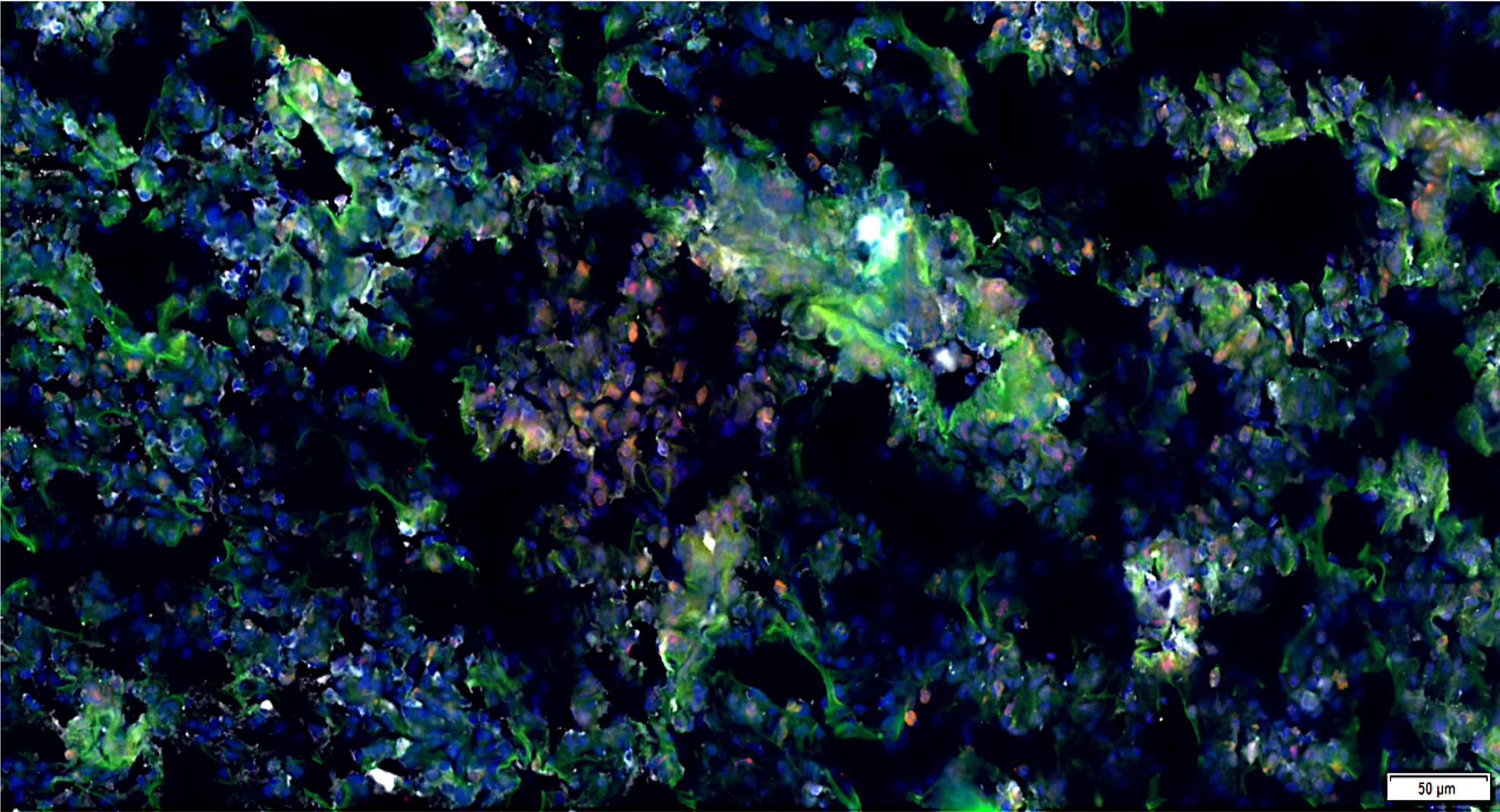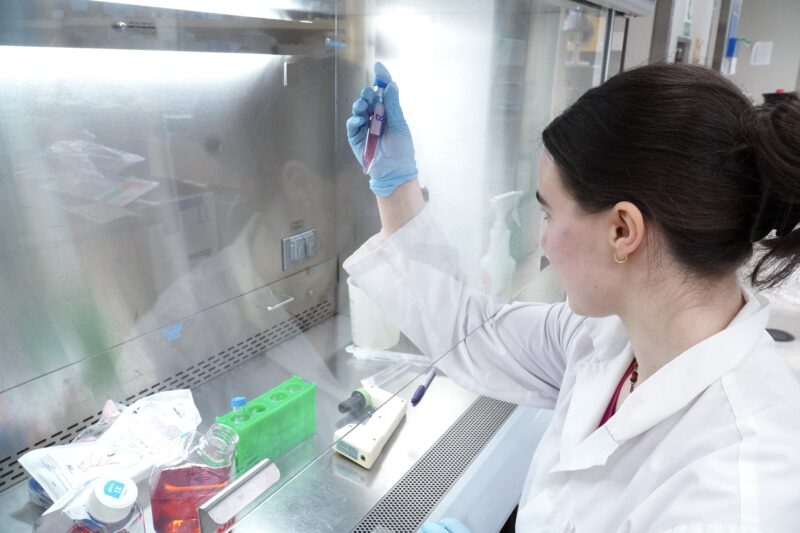Newsroom
Jefferies lab demonstrates potential of a novel cell-based immunotherapy for cancer

Jefferies lab graduate students Clara Xia (left) and Stephanie Besoiu (right).
A new study from the laboratory of Professor Jefferies in the Michael Smith Laboratories, Department of Medical Genetics, Department of Microbiology and Immunology and the Centre for Blood Research highlights a promising, novel avenue for cancer immunotherapy using Type 2 innate lymphoid cells.
In recent years, significant strides have been made in the field of cell-based immunotherapy. However, while these advancements have offered a beacon of hope for cancer patients, the response rates to these therapies have unfortunately remained low.
Type 2 innate lymphoid cells (ILC2s) have previously been recognized for their ability to modulate immune responses, including response to parasitic infections. Now, a new study from the Jefferies lab, published in Frontiers in Immunology, is the first to demonstrate the potential of ILC2s to confer anti-cancer immune response and to modulate T-cell response towards eradicating tumours in any preclinical model of cancer. In fact, in some settings, ILC2s transferred into mice were able to completely halt tumour growth during the study period.
“Solid tumours are often quite resistant to cancer immunotherapies. The fact that we observed a dramatic effect of the ILC2s in reducing the growth of solid tumours was exciting and somewhat unexpected,” highlights Professor Jefferies.
Working with Professor Martin Gleave, Director of the Vancouver Prostate Centre at UBC, the research team was also able to demonstrate that this mechanism may have direct relevance for patients with prostate cancer, also highlighting the potential of this immunotherapy for treatment across various cancer types.

While there are still many steps to take following these results, the team is encouraged by their new findings. In particular, not only were the ILC2s effective at reducing cancer growth, but when compared with CAR T-cell therapies, another cell-based therapy for cancer, they could be up to 150-fold more effective, and much less expensive to produce. If these findings can be translated to the treatment of human cancers, it could allow for more cancer patients to gain access to a more effective, widely applicable immunotherapy.
The entry of immune cells and mediators into the tumour appears to be part of the reason ILC2s are able to suppress tumour growth.
“The activation of the ILC2s further enhances the effects of anti-tumour treatments, and overcomes existing challenges of cell-based immunotherapy,” explains Dr. Iryna Saranchova, co-first author of the study.

Multiplex Immunofluorescence technologies highlight ILC2s (orange) in mouse lungs.
“Solid tumours are resistant to cancer treatments because often times immune cells, including cell-based cancer immunotherapies like widely researched CAR T-cell therapies, are unable to penetrate into the tumour mass to exert anti-tumoural effects. With the transfer of ILC2s, we observe an influx of effector immune cells into the tumour mass as well as reduced tumour sizes. This is an exciting finding because it can potentially resolve the most difficult problem associated with most immunotherapies,” describes Clara Xia, also co-first author of the study.
 However, while these findings are promising, the exact mechanism for how this infiltration occurs still requires further investigation. This underlies the current research endeavors of co-author and PhD candidate Stephanie Besoiu. She hopes her work will reveal the connections between ILC2s and diminished tumour growth, with particular emphasis on how they modulate sentries in this process, like helper T-cells, and the consequential cascade of pro-inflammatory mediators and immune cell recruitment.
However, while these findings are promising, the exact mechanism for how this infiltration occurs still requires further investigation. This underlies the current research endeavors of co-author and PhD candidate Stephanie Besoiu. She hopes her work will reveal the connections between ILC2s and diminished tumour growth, with particular emphasis on how they modulate sentries in this process, like helper T-cells, and the consequential cascade of pro-inflammatory mediators and immune cell recruitment.
“It is known that ILC2s can activate helper T-cells, which can release various pro-inflammatory mediators, and our previous work demonstrated that ILC2s recruit other immune cells such as cytolytic T cells, the executioners of cancer cells. Our current research looks to expand our understanding of the other mechanisms underlying the connection between ILC2s and reduced tumour growth,” describes Besoiu.
Building upon these foundational proof-of-concept studies, the group hopes to progress to clinical trials, and ultimately, to create a new, clinically proven immunotherapy for cancer that addresses the challenges of current therapies.
“Existing CAR T-cell therapies for cancer can cost up to $1 million per patient. Type 2 innate lymphoid cells show promise as a cost-effective alternative, potentially filling this crucial gap in cancer treatment. Their affordability and potential for widespread use represent a significant advancement in making cancer immunotherapy more effective and accessible worldwide,” emphasizes Professor Jefferies.
This research was supported by the Canadian Institutes of Health Research, Natural Sciences and Engineering Research Council of Canada, MITACS Accelerate Fellowship, Zymeworks Fellowship, the Centre for Blood Research, the University of British Columbia, and by donations to the laboratory of WAJ through the Sullivan Urology Foundation at Vancouver General Hospital (https://www.urologyfoundation.ca).